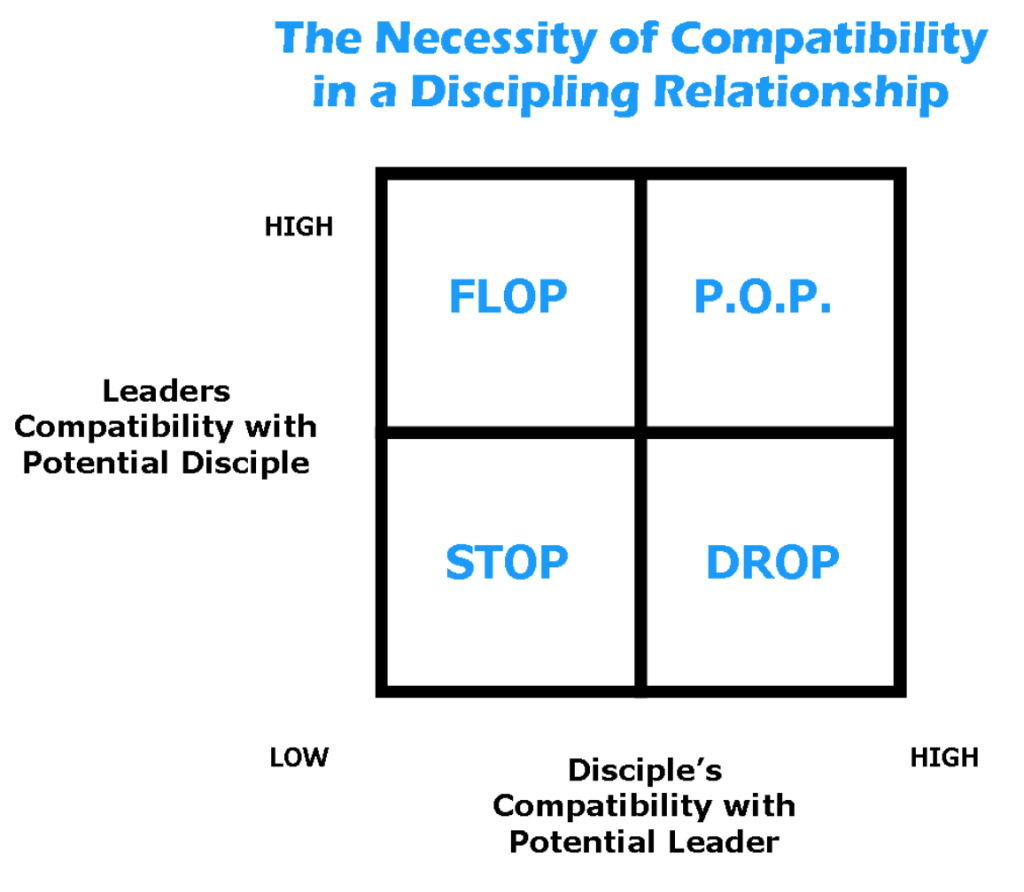In the world of technology, there’s a very simple (yet in reality very complex) concept called “compatibility.”
For example, there are certain apps that work on iphones, but if you try to use them on an android…good luck…it won’t work. While most people’s geek quotient (or “G.Q.”) is not high enough to explain why this reality exists (I am one of those people), a simple way to explain it is to say the iphone app is not compatible with the android phone.
When we talk about compatibility in relationships, we are talking about a certain kind of fit between people. We all know good compatibility when we experience it. You have a certain connection with someone that you do not have with other people. It could be personality, season of life, or some other factor. Its not right or wrong, it just is what it is. When there is good compatibility between two people, they both often find themselves thinking “I would enjoy spending more time around that person.”
Compatibility: A neccessity for discipling relationships
So what does compatibility have to do with discipling relationships? Well, compatibility is actually one of the most critical ingredients to a successful discipling relationship.
Discipleship is fundamentally about imitation. If this is true, then we are given our first clue as to what holds a discipling relationship together. Without a significant level of attraction between leader and follower, then a discipling relationship is not even likely to start.
There has to be a positive reaction between leader and follower that makes them want to spend time around each other. They have to like each other and be open to each other.
You may be saying something like this to yourself right now: “That sounds right, but shouldn’t we be open to discipling everyone? It sounds like you are saying we should only disciple people we personally like. Doesn’t Jesus tell us to disciple everyone? Isn’t this compatibility thing a bit…well….selfish? Should this really be a part of the equation, or is this whole compatibility thing just an excuse not to engage people who are different from us?”
Well, this are all really good questions. So let’s go a little deeper to substantiate the necessity for compatibility in discipling relationships.
Discipling relationships require frequent interactions. If the follower is going to imitate the life of the leader, then the follower has to have access to the leader’s life. This means they will spend time with each other outside of the classroom, small groups, or bible studies. If there is not a significant amount of compatibility in the relationship, both people will experience relational fatigue from being around each other. After fatigue sets in, then hanging out together in organic and spontaneous ways is not likely to happen.
Also, a good discipling relationship will be characterized by both grace and truth.
Grace means there’s lots of support and encouragement given when someone is working through their own unique challenges to being more like Jesus. Speaking truth, however, requires that a certain level of challenge be brought into the relationship so people can wrestle with the realities of where they are and where they need to be going.
If you already rub someone the wrong way (or if they rub you the wrong way), then imagine what introducing an ever increasing level of challenge into that relationship will do. There will be some serious friction…otherwise known as conflict! Good compatibility is the permission structure that allows challenge to take place in a discipling relationship.
Imitating Jesus the Disciple Maker
Notice what Mark says in his gospel about the criteria Jesus used when inviting the 12 to become apostles: ”And He went up on the mountain and called to Him those He Himself wanted. And they came to Him. Then He appointed twelve, that they might be with Him and that He might send them out to preach…”
There are two things worth noting here: Jesus had a preference for whom he wanted to invite closer and invest to his life. We do not know what these preferences were, but those preferences were a determining factor in his method of choosing the 12. This runs counter to our notion of equality and treating everyone the same. The truth of the matter is, Jesus modeled for us the best possible way to choose people that we will invest our life into.
Jesus chose the twelve that they might be with him. That means they would be around each other a lot! If there are low levels of compatibility, then this can be a real problem for both people involved, not to mention the rest of the group. Compatibility is the attractional force that holds the discipling relationship together.
Jesus, as the best discipler ever, knew the critical role compatibility played in the discipling relationship. As such, he was modeling to the 12, and us, how to go about inviting people into a discipling relationship.
Compatability: A Two-way street
We should mention at this point that good compatibility is not always experienced the same way or at the same level between people. This can make the process of inviting people into a discipling relationship a bit tricky. A leader may not have a lot of compatibility with a particular person, but that same person may actually experience, on their end, a higher (sometimes unusually higher) level of compatibility with the leader.
Chalk it up to charisma, gravitas, or whatever, but I think we have all had the experience of someone revealing to us that they like us in some way and we in turn think to ourselves “Really, because I thought you didn’t like me at all.”
This can also happen from the leader’s perspective. They may think there is a high level of compatibility between them and another potential follower, when in actuality it is only the leader who is experiencing a positive reaction. Recognizing that compatibility is often a subjective experience can help us navigate the relational landscape that emerges in when seeking to enter into a discipling relationship with someone (whether leader or follower.) Consider the matrix below.
Flop
Flop happens when the leader over estimates the level of compatibility in the relationship and invites someone into a discipling relationship.
If the potential follower is not open to being led by the leader, and yet enters into a discipling relationship anyway, it can make it quite challenging for the relationship to stay together. This kind of relationship typically happens when we take an overly mechanistic approach to discipling people.
Discipling relationships do not form like signing up for a small group. It is an entirely different kind of relationship characterized by high commitment and high accountability. Without significant levels of compatibility between the follower and the leader, over the long run, the relationship will likely flop. In most cases, the relationship either does not last, or it becomes a significant drag for both the leader, the follower and others in the discipling group.
Stop
When neither the leader or the potential follower have significant levels of good compatibility, then a discipling relationship rarely forms.
When neither person says to themselves “I think I might like to spend some more time around that person” then cause and effect typically keep this kind of discipling relationship from forming. However, there are times when people try to force this kind of relationship into a discipling format and it can be a disaster. Steer clear when compatibility is hovering close to nil.
Drop
Drop happens when someone experiences compatibility with you as a leader and is open to being discipled by you, but you do not share the same level of compatibility with them, or you simply do not recognize their openness to you.
A good way to limit the number of opportunities that you drop is to develop a routine of praying about people who are within frequent spatial proximity to.
More often than not, we drop opportunities when we are not being sensitive to who the Lord is putting in our pathway. Sometimes someone may be open to being led by you, but they may communicate it in ways that you don’t recognize. Jesus spent the whole night in prayer before he selected the 12. There are obvious spiritual implications to this, but I can’t help but wonder what kind of revelation he received during the night from the Father that may have caused him to change course and select Thomas instead of …..Mathias? Jesus was sensitive to what the Father wanted to happen, and when it came to inviting people into discipling relationships, he spent a significant time discerning God’s voice about who he should invest his time and energy into.
A word of caution: It typically requires a certain degree of maturity in the leader to effectively disciple people he does not have compatibility with. This has to be discerned, just like Jesus, through prayer.
P.O.P.
P.O.P. stands for Person of Peace and is taken from Jesus’ teaching in Luke 10. The basic definition of a Person of Peace is this: “You like them and they like You.”
Stated positively, a person of peace is someone with whom you have relational harmony and synergy with. Stated negatively, it can mean relational friction, hostility or indifference.
Jesus told the 72 in Luke 10 when he sent them out, that when they came to a house they should say “Peace to you.” If a “person of peace” was there, they should stay at that house. What Jesus was essentially saying was this: A person of peace is someone who wants to hang out with you and invite you into their personal space. When you have a moderate to high level of compatibility with someone, this elevates the potential for a discipling relationship to emerge.
If discipleship is about imitation, then the person of peace is somehow drawn to want to be around you. They demonstrate openness to you and may want to serve you and even follow you.
I have experienced my share of FLOPs and a DROPs before, and each time, hind sight being 20/20, a good amount of prayer and discernment would have probably steered me into another course of action. As I mature in becoming a disciple maker, I find that I am more keenly aware of where I am in relation to other people, and where they are in relation to me as a leader/follower.
Have you ever experienced a highly compatible discipleship relationship? Tell us about it!
“Let’s begin my V3 church planting journey today!”
Click these links! You’ll automatically share on Facebook or Twitter.
Photo credit David Joyce.
Share this Post


